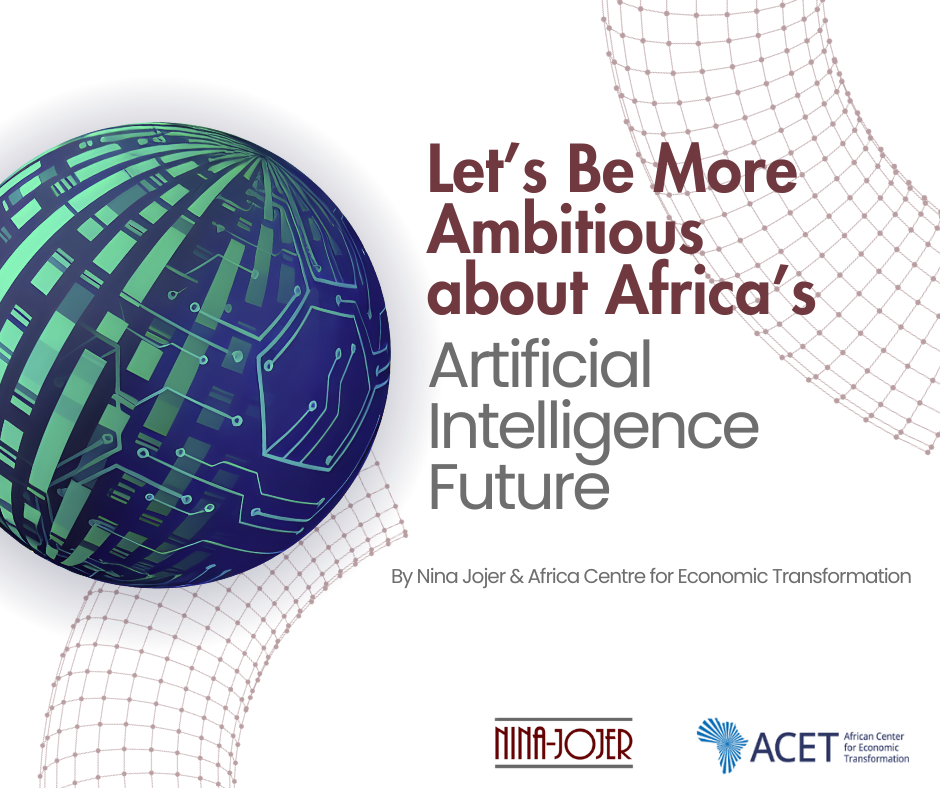Nina Jojer

Let’s Be More Ambitious about Africa’s Artificial Intelligence Future
Tech & Innovations
Published on 2024-01-15
AI, Innovation, Digital Policy
Artificial intelligence remains a topical issue as we enter 2024. Last year, generative AI exploded, changing perceptions about AI almost overnight – both good and bad. President Biden issued an executive order on October 30, 2023, setting new standards for AI safety and security in the United States. The order aims to balance privacy and innovation, but it is not a binding law. Meanwhile, the EU reached a tentative agreement on the EU Artificial Intelligence Act in December. The act covers rights, democracy, the rule of law, and environmental sustainability. It still needs formal approval from both Parliament and Council to become an EU law.
Meanwhile, the UK hosted a global AI Summit that produced the Bletchley Declaration, a pledge to “support an internationally inclusive network of scientific research on frontier AI safety” and to “sustain an inclusive global dialogue that engages existing international fora…” African delegations from Kenya, Nigeria, and Rwanda welcomed and supported the Summit’s focus on Africa.
AI offers great opportunities and challenges for Africa. The international community and African stakeholders need to be more ambitious. The AU’s Digital Transformation Strategy (DTS) was a commendable start. Since May 2022, the African Union High-Level Panel on Emerging Technologies (APET) has been working on the AU’s AI strategy. In addition, South Africa, Benin, Egypt, Ghana, Nigeria, Senegal, Tunisia, Côte d’Ivoire, Ghana, Morocco, Nigeria, and Senegal have all made significant progress in developing their own AI strategies or frameworks. While encouraging, these national strategies also complicate the implementation of a comprehensive AU strategy.
At the global AI summit, the UK government and other partners announced a $100 million program on responsible AI, starting with Africa. Nearly half of this will come from the UK to invest in technology partnerships, while the International Development Research Centre (IDRC) in Canada is contributing more than $8 million. Other partners include the Bill and Melinda Gates Foundation and USAID. IDRC has already committed nearly $50 million in more than 30 countries to support AI research and innovation, with a focus on areas such as feminist AI, AI for global health, and AI for COVID response.
The program is a welcome step, but it may not be enough. It aims to benefit people who speak 46 African languages, but Africa has more than 1000 languages, and at least 75 of them have over a million speakers. As AI learns from more languages and contexts, it should include more African languages. This will help reduce the biases that users encounter with AI applications in Africa.
The program aims to make at least five African countries “globally influential in the worldwide conversation on AI”. But Africa has 54 nations, and many of them have the potential to be global players in AI. Some have expertise in health or education, others in agriculture or disaster response. Some train data scientists, and some host world-class AI research institutions. Across the continent, innovators and entrepreneurs are advancing practical applications for AI that can have global impact. For instance, the African Center for Economic Transformation (ACET) is launching a three-year program on AI in economic policymaking, with support from IDRC. The program hopes to make some African countries global leaders on using AI for fiscal and monetary policy.
Similarly, the UK initiative seeks to support at least ten countries in creating effective regulatory frameworks for responsible, equitable and safe AI. While this is welcomed, an alternative and more comprehensive approach would be to support the AU establishing and implementing harmonized and interoperable legal frameworks across the continent, within an Africa-wide AI strategy. Moreover, the initiative should not limit itself to sub-Saharan Africa, but include North Africa as well. This would create more opportunities for synergy and learning. For example, the Moroccan International Center for Artificial Intelligence and the success of Instadeep in Tunisia are examples where lessons learned could be shared with sub-Saharan Africa partners.
To prepare for the AI revolution, Africa needs data privacy laws, cybersecurity laws, and cross border data flows. These laws can protect the rights and interests of data subjects, ensure the safety and reliability of data and networks, and promote data and AI exchange and collaboration across borders. Likewise, policy incentives to attract investments in data storage and cooperation to assist countries with data storage systems are also necessary.
As Africa moves toward an era of green industrialization powered by new technologies, the process of economic transformation, partly driven by AI, must become more urgent. Therefore, African policy goals must become more ambitious, and must be backed by stronger programs of support.
Authors
Rob Floyd is Director for Innovation and Digital Policy at the African Center for Economic Transformation.
Joseph Ishie is Client Advisory & Business Development Manager at Nina Jojer.